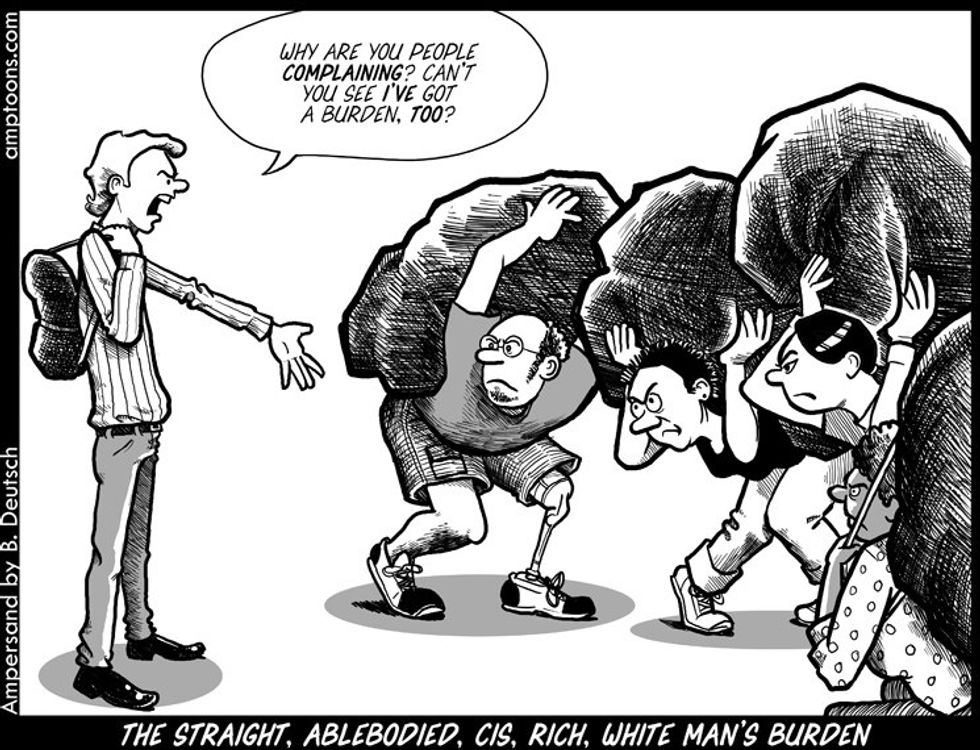Whether we realize it or not, the majority of us are privileged in some way or another. All my life I've never really had the opportunity to reflect upon my own privilege until I began to take a Women's and Gender Studies class this semester.
Our current unit delves into the psyche of white males in particular, focusing on oppression and privilege. Therefore, our teacher had us conduct our own self-evaluations of our privilege—a privilege that, as college students at a four-year, private, Catholic, Jesuit university, we can no longer deny.
The tricky thing about privilege is that people often consider privilege to solely apply to things such as race, gender, wealth, etc. However, in reality, the spectrum of privilege is far grander than we could even begin to imagine. Recently, I began to realize that I am more privileged than I had previously acknowledged. Yes, I'm white, which is a privilege in it of itself, but it doesn't just stop there. I am able-bodied, I am an American, I can open any textbook for my classes and expect my demographic to be represented.
In case you are still skeptical about the nature of your privilege, here's your opportunity to do a self-evaluation. Keep track of how many of the following statements you can identify with.
[ ] I am a male.
[ ] I live in America.
[ ] I live in a house.
[ ] I attend or have attended school.
[ ] My demographic is usually represented in print advertisements, on TV, and inliterature.
[ ] I have a job.
[ ] I have been to the doctor.
[ ] I do not have a disability (mental or physical).
[ ] I am never asked to speak on behalf of my race or social class.
[ ] I can be in charge and demanding without being called "bossy" or a "bitch."
[ ] I am heterosexual.
[ ] I can go places alone without feeling threatened or unsafe.
[ ] I can address race without seeming self-interested.
[ ] I can cover up blemishes or injuries with makeup or bandages that match thecolor of my skin.
[ ] I am comfortable in the gender I was born in.
[ ] I have never been discriminated against because of my gender.
[ ] When I speak to the head of a company, I can assume that I will be facing someone who identifies themselves to be a part of the same race as me.
[ ] I have never been catcalled or derogatorily addressed in public.
[ ] English is my first language.
[ ] I have my own car.
[ ] I attended a privatehigh school or college.
[ ] I have traveled abroad.
[ ] I have never contemplatedsuicide.
[ ] I have never been shamed for my religious beliefs or affiliation.
[ ] I have never been singled out by the TSA or law enforcement officers.
[ ] I have access to food and clean water.
After conducting that self-evaluation, count up your total. If you identified with more than one statement, you are privileged, possibly more than you had previously realized. Too often, we take simple things such as shelter, food and water for granted.
As a society, one of our worst crimes is the denial of privilege. When we downplay our privilege, we inadvertently insult those who do not have the same opportunities that we have. We seem spoiled, narcissistic and arrogant. Very commonly, when we are made aware of our privilege, we often deny responsibility and sometimes feel threatened. Which, in retrospect, is very twisted and rather ironic. It is for this very reason that I have decided that it is time that we acknowledge our privilege and work toward equality on a grander scale.
In an effort to do so, BuzzFeed recently conducted a social experiment with people that range across a wide array of demographics in the interest of privilege. The experiment was entitled "The Privilege Walk". Throughout this video, a hefty list of privileges is read aloud and participants move ahead and behind accordingly, depending on their affiliation with the statements that are read aloud. Although they begin at the same spot, they end up in completely different places.
Exercises such as this one are designed to show those who doubt or refuse to acknowledge their privilege that they are not alone, by comparing them to friends, peers and even strangers. Allowing them the opportunity to compare themselves to others and the privileges of others makes them all the more likely to accept their own privilege.
It is time that we recognize our privilege and strive to diminish it. People need to realize that the denial of privilege is not just ignorant, but it is hurtful toward minorities and those who do not have these same privileges. It is time that we, as a society, are aware of our privileges, big and small. It is time that straight, able-bodied, cisgender, rich, white men share the privileges that they so dutifully take for granted.






















